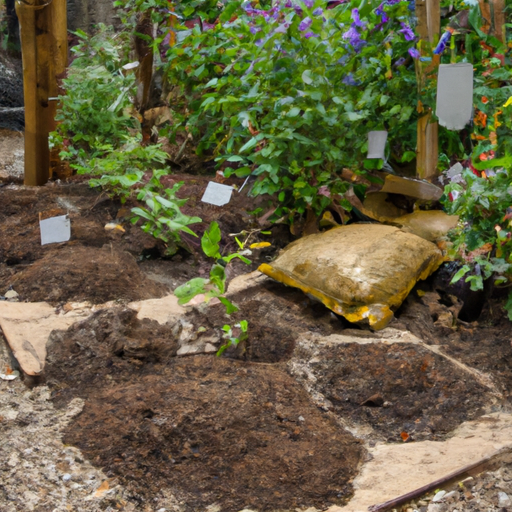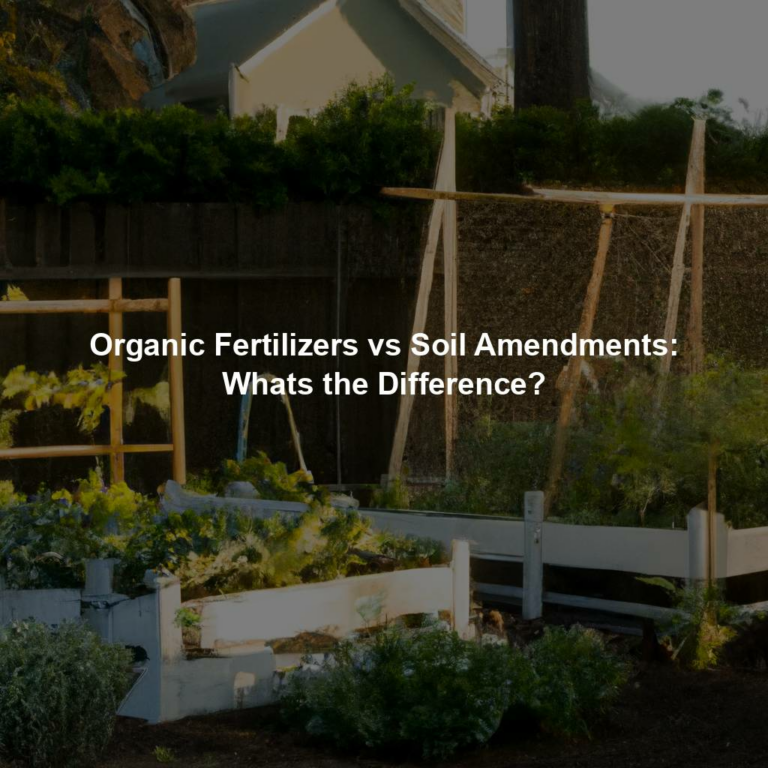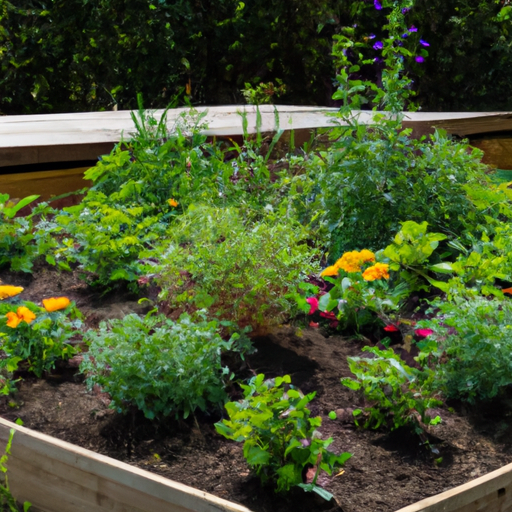As a Master Gardener, I have seen firsthand the benefits of using organic soil amendments in my garden.
Organic soil amendments are natural substances that can be added to soil to improve its fertility and structure. By incorporating these materials into your garden, you can provide essential nutrients for plants, increase water retention, and promote healthy root growth.
One major benefit of using organic soil amendments is their ability to enhance plant growth without harmful chemicals or synthetic fertilizers.
These natural substances break down slowly over time, releasing valuable nutrients like nitrogen, phosphorus, and potassium as they decompose. This slow-release process ensures that plants receive a steady supply of nutrients throughout the growing season, resulting in healthier plants with stronger roots and better yields.
Additionally, because organic soil amendments do not contain harsh chemicals or pesticides, they are safer for the environment and for those who work in the garden.
Improved Soil Fertility
As a Master Gardener, I have found that using organic soil amendments can greatly improve the fertility of your soil.
One major benefit is improved soil structure, which allows for better root growth and nutrient absorption by plants.
Organic matter in the form of compost or manure helps to aerate heavy soils and retain moisture in sandy soils.
This leads to an increase in microbial activity, which breaks down nutrients into forms that are easily absorbed by plant roots.
With regular use of organic amendments, you will notice healthier plants with stronger stems and more vibrant foliage.
So don’t hesitate to start incorporating these natural fertilizers into your gardening routine!
Increased Water Retention
But did you know that using organic soil amendments can also increase water retention in your garden?
That’s right, by improving the soil texture with natural materials like compost and manure, you can create a sponge-like effect that holds onto moisture for longer periods of time.
This means fewer trips to the watering can or hose, as well as improved irrigation efficiency overall.
Not only will this save you time and money, but it also promotes healthy root growth and reduces plant stress during dry spells.
So next time you’re considering ways to improve your garden’s health, don’t forget about the benefits of organic soil amendments for increased water retention.
Healthy Root Growth
Healthy Root Growth:
One of the biggest benefits of using organic soil amendments is promoting healthy root growth. When plants have strong, healthy roots they are better equipped to absorb nutrients from the soil and fend off disease and pests.
Organic amendments also increase microbial activity in the soil which helps break down organic matter into nutrients that can be easily absorbed by plant roots. This creates a symbiotic relationship between the plants and microorganisms in the soil, resulting in healthier and more productive gardens.
To truly appreciate how beneficial organic soil amendments are for healthy root growth, consider these emotional sub-lists:
– Benefits for your plants:
– Stronger stems
– Increased resistance to disease
– Higher crop yields
– Environmental impact:
– Reduced use of synthetic fertilizers and pesticides
– Improved water retention in soil
– Decreased erosion
– Personal satisfaction:
– Knowing you’re doing your part for sustainable gardening practices
– Seeing your garden thrive with minimal effort
– Creating an outdoor space that promotes health and well-being
By incorporating organic soil amendments into our gardening practices, we not only improve nutrient absorption and microbial activity but create a holistic approach to cultivating thriving plants.
Let’s continue to promote healthy root growth through natural means!
Sustainable Plant Growth
While organic soil amendments provide numerous benefits, they also contribute to sustainable plant growth.
As a Master Gardener, I highly recommend incorporating composting techniques into your gardening practices. Composting not only reduces waste but also creates nutrient-rich soil that promotes healthy plant growth. By using organic materials instead of synthetic fertilizers, gardeners can decrease their environmental impact and contribute to the sustainability of our planet.
In addition to composting, natural pest control is another essential aspect of sustainable plant growth. Rather than relying on harmful pesticides, try attracting beneficial insects like ladybugs and lacewings to your garden by planting flowers such as marigolds or dill. These helpful bugs will prey on harmful pests while promoting a balanced ecosystem in your garden.
Overall, utilizing organic soil amendments and implementing sustainable gardening practices are key factors for achieving optimal plant growth while minimizing harm to the environment.
With simple changes like composting and natural pest control methods, we can all play a role in maintaining a healthier world for future generations without sacrificing the beauty of our gardens.
Environmental Safety
As a Master Gardener, it’s essential to consider not only the benefits of organic soil amendments but also their environmental impact.
One way to ensure eco-friendly alternatives is by opting for chemical-free solutions that are safe for both plants and people. Organic soil amendments offer a natural approach to gardening without compromising the environment, unlike synthetic fertilizers that may contain harmful chemicals that can accumulate in the soil over time.
By using organic methods such as composting, manure, or cover crops, gardeners can provide nutrients to the soil while promoting sustainability and minimizing waste.
It’s crucial to prioritize responsible practices when tending to our gardens so that we can create thriving ecosystems while protecting our planet from further harm.
Frequently Asked Questions
What Exactly Are Organic Soil Amendments And How Are They Different From Other Types Of Soil Amendments?
When it comes to improving the quality of soil, there are various types of soil amendments available.
Organic soil amendments refer to materials that come from natural sources such as animal waste or plant matter. They differ from inorganic options like synthetic fertilizers because they do not contain any harmful chemicals or additives.
Instead, organic soil amendments provide a range of benefits including increased nutrient availability and improved water retention capacity. However, it is important to note that these benefits also come with limitations, such as slower release rates and potential risks for pathogens if not properly composted before application.
The type and application method of organic soil amendments depend on several factors such as the current state of the soil, crop requirements, and environmental conditions.
As a Master Gardener, understanding the advantages and drawbacks of different types of soil amendments is crucial for achieving optimal plant growth while promoting sustainable gardening practices.
How Often Should I Apply Organic Soil Amendments To My Garden Or Farm?
To achieve optimal results, timing and frequency of application are key when it comes to organic soil amendments. The frequency of application depends on the type of amendment used and the needs of your specific garden or farm.
Generally speaking, it’s best to apply smaller amounts more frequently rather than larger amounts less often. Timing of application is also crucial – for example, applying compost before planting will help provide nutrients throughout the growing season while adding in the fall will improve soil structure during winter months.
As a Master Gardener, I highly recommend keeping track of when you’ve applied organic soil amendments and experimenting with different frequencies to see what works best for your unique situation.
Can Organic Soil Amendments Help To Prevent Or Control Plant Diseases And Pests?
Organic soil amendments have numerous benefits for both plant health and productivity. When applied to your garden or farm, they can help prevent and control plant diseases and pests by improving soil fertility and structure.
As a Master Gardener, I highly recommend incorporating organic soil amendments into your gardening routine. Not only will you see an improvement in the overall health of your plants, but you’ll also be promoting sustainable and environmentally-friendly practices.
With regular applications, you’ll reap the rewards of healthier plants with increased yields and resistance to disease and pests.
Are There Any Specific Types Of Plants That Benefit More From Organic Soil Amendments Than Others?
As a Master Gardener, it’s important to understand the crop suitability of various types of plants when utilizing organic soil amendments.
Some crops may benefit more than others from certain amendments due to their specific nutrient requirements and growing conditions.
Additionally, soil acidity can greatly impact plant growth and health, making it crucial to choose the right amendment for your soil type.
By carefully selecting and applying organic soil amendments tailored to your crops’ needs, you can expect healthier, stronger plants and higher yields in your garden or farm.
Can Organic Soil Amendments Be Harmful To The Environment Or Have Any Negative Impacts On Wildlife?
Organic soil amendments can have great benefits for your garden, but it’s important to consider their impact on the environment and wildlife.
As a Master Gardener, I always prioritize eco-friendliness and wildlife preservation in my gardening practices.
While organic soil amendments are generally safe when used correctly, some types may contain harmful chemicals or toxins that could harm animals if not properly disposed of.
It’s also important to consider the potential impact on local ecosystems and water sources.
Always do your research and choose environmentally-friendly options whenever possible to ensure a healthy garden and planet.
Conclusion
In conclusion, as a Master Gardener, I highly recommend using organic soil amendments in your garden or farm. These natural materials not only improve the overall health of your soil but also provide numerous benefits for your plants.
By adding organic matter to your soil on a regular basis, you can increase its water-holding capacity and nutrient content. This will result in healthier plants that are more resistant to pests and diseases.
Moreover, because organic soil amendments are derived from natural sources such as composted manure or worm castings, they do not harm the environment or wildlife.
So why settle for inferior results when you can achieve optimal growth with the help of organic soil amendments? Give them a try today and watch your garden flourish like never before! As the saying goes, ‘A healthy plant begins with healthy roots.’ With organic soil amendments, you’ll be well on your way to cultivating a thriving garden full of vibrant colors and robust flavors.






